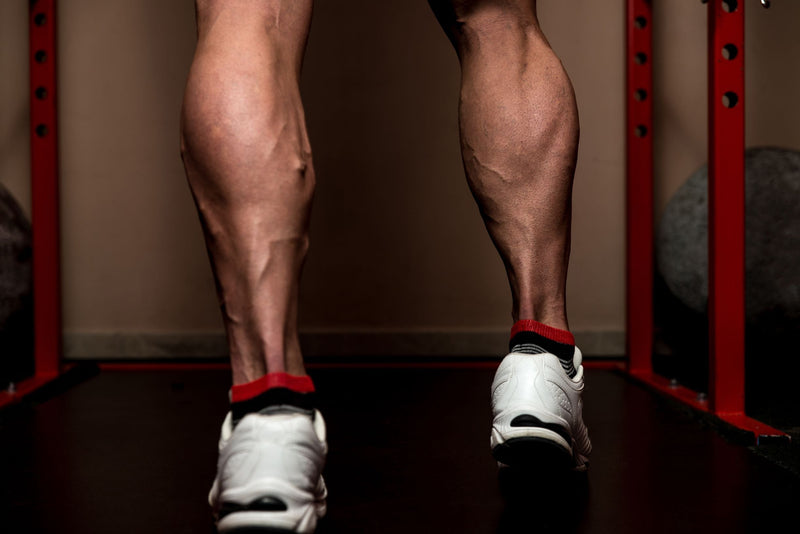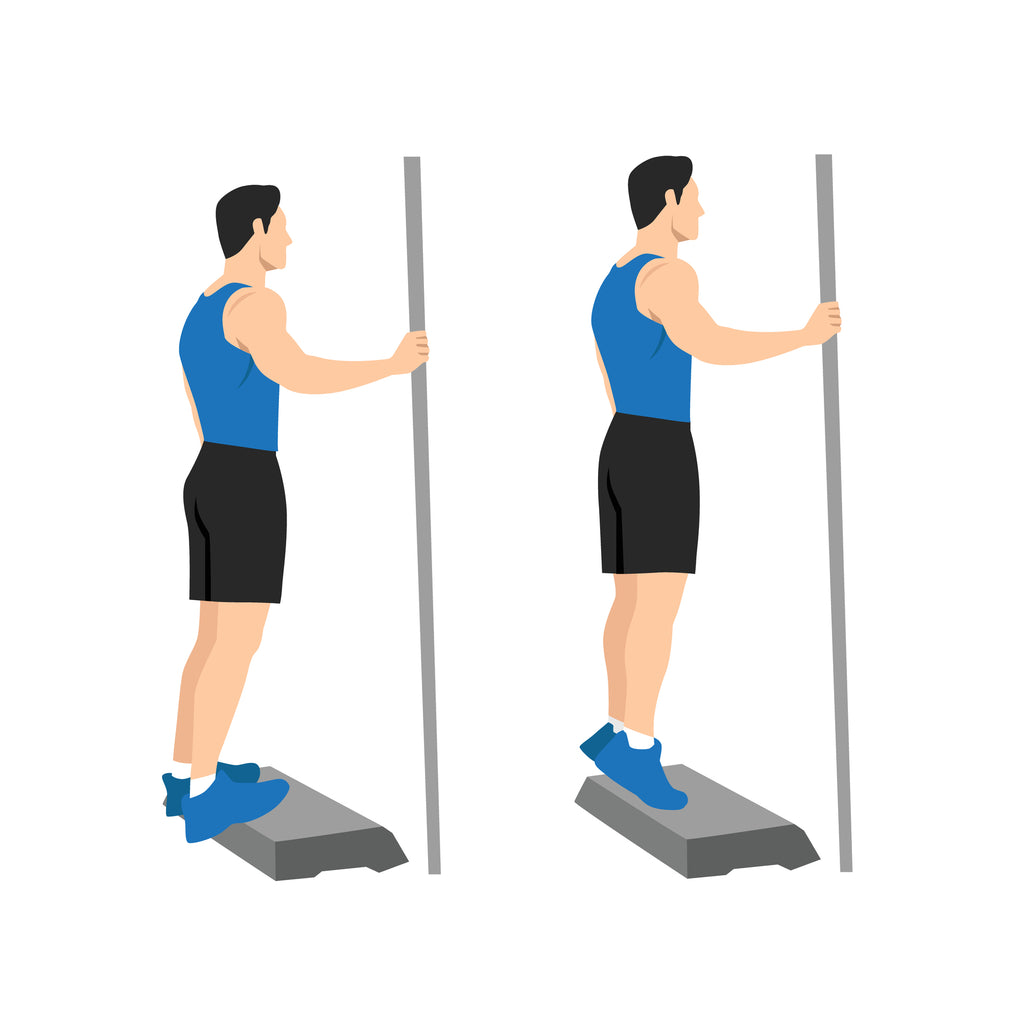What Are the Best Calf Exercises? How to Build Bigger Calves at Home!

Got Stubborn Calves? Do This Calf Workout At Home (or in the Gym)!
The calf muscles are neglected by many gym-goers, and those who do train their calves seem to treat them like a "cool down" after annihilating every other muscle in their legs. It’s no surprise that people often complain they can't get their calves to grow. The reality is they just don’t put enough effort into their calf workout.
Worse yet, halfhearted calf workouts after training the upper legs may not be targeting the gastrocnemius, soleus, and plantaris with the best movements or form. With that in mind, this article will detail several calf exercises you can do at home to transform your calves into "cows" — no need for tons of free weights or machines.
Calf Muscle Anatomy
To better understand how to train the calves properly, let's quickly go over the anatomy and biomechanical function of calf muscles.
The calves are a group of muscles situated on the posterior side of the lower leg, specifically the gastrocnemius, soleus, and plantaris. These calf muscles run from the back of the knee to the heel and are plantar flexors of the ankle (think: standing on the tips of your toes) as well as knee flexors [1]. Hence, calf muscles are not able to exert full contractile force on both knee and ankle simultaneously.

Image Credit: OpenStax, CC BY 4.0 <https://creativecommons.org/licenses/by/4.0>, via Wikimedia Commons
Research shows that the gastrocnemius, soleus, and plantaris are most effectively activated when the knee is fully extended [2]. Therefore, the seated calf raise and other calf exercises in which the knee joint is flexed are less than ideal for targeting the calves. The standing calf raise and calf press (with legs straight) are examples of calf exercises in which the knee joint is in full extension.
What NOT to Do for Calf Workouts
One last thing to note before detailing which calf exercises to focus on is how not to train your calves. Many gym-goers and athletes have a tendency to train their calves exclusively with ultra-high rep sets and poor technique.
Chances are you've seen the meatheads that load up the seated calf raise machine with way too much weight and bounce their calves up and down with a two-inch range of motion. Not only does this put tons of stress on the Achilles tendon, it barely engages your calf muscles.
Muscles are like rubber bands; when you stretch/elongate them with high force, stored elastic energy "snaps" them back into a shortened position [3]. In the case of the calf training for strength and hypertrophy, bouncing up and down with a limited range of motion is mostly reusing the spring-like elastic energy of the Achilles tendon to generate force [4].
The stretch reflex may be useful for athletic performance (e.g. jumping, sprinting, etc.), but not for growing the calves. Basketball players and high jumpers would all have jacked calves if it were that simple.
So, if you're struggling to develop bigger calves, odds are your form needs some fine-tuning, or your simply not using heavy enough resistance. Remember, you should feel the tension in your calf muscles, not your ankle or feet. It's good to be explosive during the concentric portion of each calf movement you perform, but don't rely on the stretch reflex to elevate the balls of your feet and lift your heels.
Now, let's get to the good part: exercises to include in your at-home calf workout!
Do This Calf Workout at Home to Build Big Calves
The calf workout below is a fantastic, easy-to-follow routine. However, it would be a bit arrogant to claim that it's the absolute best way to train your calves since some people might respond better to other calf exercises. Nevertheless, the majority of trainees should have solid success with this calf workout if they stick with it:
Calf Exercise 1: Standing Calf Raise

- Standing calf raises are a versatile movement that you can perform virtually anywhere with an elevated surface.
- To perform this calf exercise at home, take a shoulder-width stance and place the balls of your feet on a stair step or sturdy chair with a hard, flat seat cushion. Lift your heels by contracting your calves explosively until you're on your toes. Hold for a brief pause at the top, then take 2-3 seconds to slowly lower your heels back to just below parallel with the elevated surface. Repeat.
- Perform 3-4 sets of 20-30 reps.
- Use a resistance band looped behind your neck and under your feet for a greater challenge. Alternatively, hold a dumbbell in each hand to add weighted resistance to this movement.
- Rest for 60-90 seconds between each set
Calf Exercise 2: Single-leg Calf Raise
- Follow the same instructions as normal standing calf raises, but only using one leg at a time. You may need to hold a rail or stable surface with the arm on the same side as your active leg to balance yourself.
- Use the same rep tempo as above; explode up on your toes, pause briefly, then slowly lower your heel back to the starting position.
- Perform 2-3 sets per leg of 15-20 reps each
- A band or dumbbell can be used to add resistance.
- Keep rest to a minimum when switching between legs. Rest for 45-60 seconds between sets.
Calf Exercise 3: Donkey Calf Raise
- For this movement, you'll need a supporting surface at about waist-height and a 1-2" block or platform to put your feet on. Bend at the hips to place your torso at a 90-degree angle (elbows under your shoulders, like a plank) on the surface in front of you. (A bed or couch can do just the trick for this exercise.)
- Place your feet on the block/platform, such as a block of wood or portable aerobics step, and perform a calf raise just like you would when standing upright.
- Perform 3-4 sets per leg of 20-30 reps each
**Here's a helpful video on donkey calf raises.
Bonus Calf Movement for Gym Workouts: Calf Press on Leg Press

- Similar to the above calf raises, the calf press is a great way to target the lower legs since it places the knees in a favorable extended joint angle.
- If you have access to a leg press machine or seated calf press, this exercise is a great finishing movement for your calf workouts.
- Aim for a higher rep range when doing these (e.g. 20-30 reps per set).
And voila! A simple calf workout you can do at home or the gym. (Don’t be surprised if you struggle to walk for a few days afterward.) Follow this calf routine twice per week; it's generally ideal to do train your calves at the beginning or end of lower-body workouts.
Don't Neglect Calf Exercises!
Growing the calves into “cows” is arguably the most difficult task for some fitness enthusiasts, but the simplest task for others. We have all heard the self-loathing "my genetics suck" excuse from those who can't their calves to grow.
Yes, your genetics do determine your muscle morphology to a degree, but you can still develop an impressive set of calves with the right exercise selection and consistency. The gastrocnemius, soleus, and plantaris are just like any other skeletal muscle — they will grow if you train them with enough volume and intensity.
In other words: Don't treat your calves like an "after-thought" on leg day.
If anything, start your lower-body workouts with a few calf exercises as this can help improve mobility on compound exercises like barbell squats and lunges. Push yourself and be explosive (again, without relying too much on the stretch reflex).
Lastly, remember that you need ample calories and quality protein to facilitate muscle growth. You can’t turn your calves into cows with just the calf workout above. For help with your calorie and macronutrient needs for muscle growth, check out our Beginner's Guide to Counting Macros.































